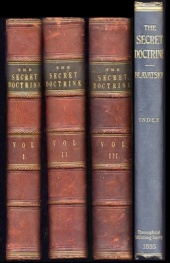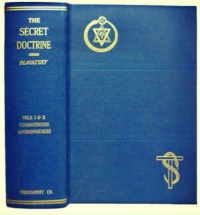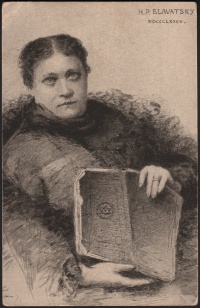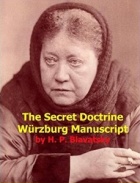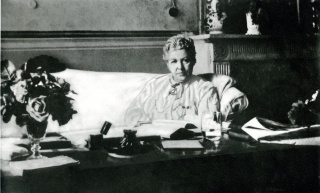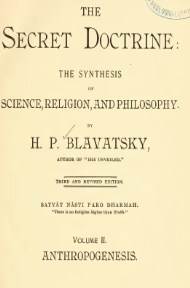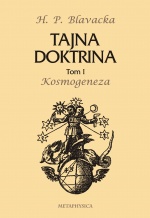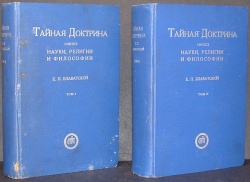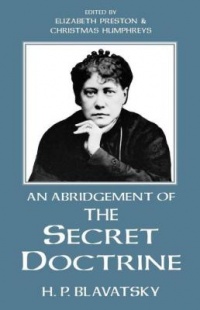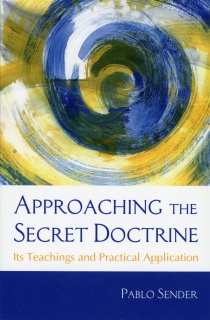The Secret Doctrine (book): Difference between revisions
| Line 299: | Line 299: | ||
=== Studies and courses === | === Studies and courses === | ||
[[File:Approaching the SD.jpg|right| | [[File:Approaching the SD.jpg|right|210px|thumb|Cover of Pablo Sender's book]] | ||
* Algeo, John. '''''Getting Acquainted with The Secret Doctrine: A Study Course'''''. 2007. 60 pages. | * Algeo, John. '''''Getting Acquainted with The Secret Doctrine: A Study Course'''''. 2007. 60 pages. | ||
: A course based on the [[Robert Bowen Notes (article)|notes taken by Robert Bowen]], a personal student of Mme. Blavatsky, which purportedly record her own advice as to how to approach the study of ''The Secret Doctrine''. | : A course based on the [[Robert Bowen Notes (article)|notes taken by Robert Bowen]], a personal student of Mme. Blavatsky, which purportedly record her own advice as to how to approach the study of ''The Secret Doctrine''. | ||
Revision as of 20:55, 16 February 2023
The Secret Doctrine, the Synthesis of Science, Religion and Philosophy, is a two-volume work written by Helena Petrovna Blavatsky, which laid the foundation of modern Theosophy. It is regarded as "one of the monuments of modern esotericism. Originally published in 1888, it gave the spiritual history of the development of the cosmos (or kosmos, as the author would have it) and of human life on earth. In doing this Mme. Blavatsky drew on her impressive knowledge of myth and ancient scripture for verification of the lineage of her theories. The book has gone on to become one of the most influentuial expositions of esoteric ideas, and its two volumes, comprising more than fifteen hundred pages, remain in print." [1]
Charles Johnston wrote of the challenge of reading the books:
I always think that to read the S.D. one must consider it an oriental work in which you have five lines of text, ten lines of commentary, and twenty lines of commentary on the commentary on each page - - very distressing to unaccustomed readers.[2]
Writing and publication of First and Second Volumes
Two excellent books describe how The Secret Doctrine was written:
- Rebirth of the Occult Tradition: How the Secret Doctrine of H. P. Blavatsky was written by Boris de Zirkoff[3]
- The Writing of THE SECRET DOCTRINE: A Chronology by Daniel H. Caldwell.[4]
Charles Johnston described a writing process that differed from that used to create Isis Unveiled: "The Masters, instead of writing thru the H.P.B. body, as described by Olcott, when Isis was written; precipitated the Secret Doctrine texts onto the Astral Light from which H.P.B. laboriously copied it – word by word!"[5]
H. P. Blavatsky is best known as the author of The Secret Doctrine, the crowning achievement of her literary endeavors. In May 1879, soon after moving to India to lead the establishment of the Theosophical Society, she began to draft The Secret Doctrine. It was intended as an enlarged and improved rendering of Isis Unveiled which, according to the Master K. H., writing in 1882, "really ought to be re-written for the sake of the family honour," and in which everything is "hardly sketched — nothing completed or fully revealed."[6]
In January 1884 the Supplement to The Theosophist published an advertisement announcing that "a New Version of Isis Unveiled," which was to be published as monthly articles. Although Mme. Blavatsky had some written material to start the monthly installments, this plan never came to fruition in the way planned, due to ill-health, her travel to Europe, and the Coulomb affair.
In January 1885 the monthly installments plan was dropped, and The Secret Doctrine was conceived as a book. In the fall of that year, a few months after HPB moved to Wurzburg, Germany, she started working steadily on writing. The Countess Wachtmeister moved with HPB to help in this endeavor. As the writing of the book developed with the help of Masters M. and K.H., HPB realized it was much more than a rewriting of Isis Unveiled. In a letter to A. P. Sinnett she said she felt that this could vindicate the Theosophical Society after the unfavorable Report that Richard Hodgson had made.[7]
In connection to the method of writing her book, HPB told Countess Wachtmeister (who had witnessed her struggle in writing a certain section on that day) the following:
Well, you see, what I do is this. I make what I can only describe as a sort of vacuum in the air before me, and fix my sight and my will upon it, and soon scene after scene passes before me like the successive pictures of a diorama, or, if I need a reference or information from some book, I fix my mind intently, and the astral counterpart of the book appears, and from it I take what I need. The more perfectly my mind is freed from distractions and mortifications, the more energy and intentness it possesses, the more easily I can do this; but today, after all the vexations I have undergone in consequence of the letter from X., I could not concentrate properly, and each time I tried I got the quotations all wrong. Master says it is right now, so let us go in and have some tea.[8]
In the spring of 1886 she sent a preliminary manuscript of the first volume to Adyar, where T. Subba Row was supposed to read it and contribute additional material related to Hindu philosophy. However, he refused to do so. HPB moved to Ostende, Belgium, where she continued working on the book.
By the end of March 1887 she fell gravely ill with a kidney infection, and was not expected to live. Master Morya came at night and asked her if she wanted to be freed from the body, or to live, with much suffering, to finish The Secret Doctrine. She agreed to finish the book. On May 1, 1887, she moved to London where a group of earnest students helped her to prepare the huge manuscript for publication.
The First Volume of The Secret Doctrine came off the press on October 20, 1888 and all 500 copies were sold out before the date of publication. The Second Volume came out towards the end of the year. The third volume, in which HPB planned to write of the history of occultism and the lives of the adepts, was never completed under her supervision. She placed that work in the hands of Annie Besant, who published it in June, 1897. See Editions: Theosophical Publishing House below.
Compilation and Publication of Third Volume
After the death of Madame Blavatsky, Annie Besant endeavored to compile the proposed Third Volume of the SD from the remaining manuscript pages. James Morgan Pryse wrote, "It [the manuscript] was in an unfinished state, and badly arranged. H.P.B. had rewritten some of the pages several times, with erasures and changes, but with nothing to indicate which copy was the final revision; Mrs. Besant had to decide that as best she might. As it contained far less matter than either of the other volumes, Mrs. Besant told me that she would pad it out by adding the E.S.T. Instructions, since H.P.B. had told her she might do so." He went on to say that critics of the third volume were unjust to Mrs. Besant and Mr. Mead.[9]
- (See The Myth of the "Missing" Third Volume of The Secret Doctrine by Daniel H. Caldwell)
Wurzburg manuscript
Some of the original manuscript was not included in the first two volumes published. Portions have been lost, but through the scholarship of David and Nancy Reigle, the Würzburg Manuscript of The Secret Doctrine was finally published in 2014. A PDF edition is available at Eastern Tradition website.
According to the editors:
It includes H. P. Blavatsky’s first translations of stanzas from the Book of Dzyan with her unrevised commentaries on them. Only the stanzas from the Würzburg manuscript had been published until now, not her unrevised commentaries on them. These comprise cosmogenesis, and a few on anthropogenesis. The Würzburg manuscript also includes a large introductory section, comprising about half the book. Most of the chapters in this introductory section were later published in the 1897 third volume of The Secret Doctrine. As with the commentaries on the stanzas, here we have her unrevised versions.
The so-called Würzburg manuscript is a partial copy of Blavatsky’s early manuscript of The Secret Doctrine, written while she was staying at Würzburg, Germany, and then at Ostende, Belgium, in 1885 and 1886. Her manuscript of the almost completed Secret Doctrine was copied by two or more scribes to send to India for revision by T. Subba Row, which revision did not occur. Only part of this copy has been found. What we have is estimated to be about a fourth or a third of the whole that was sent to India. Fortunately, it includes the whole cosmogenesis section, all seven stanzas and their commentaries.[10]
Nicholas Weeks commented: "When compared with the SD III or CW XIV many passages gain a new perspective. A few of the differences from the WMS were bracketed in CW XIV, but there could have been many more."[11]
Book Reviews
Review by Annie Besant
In 1889, W. T. Stead, the famous Editor of the Pall Mall Gazette and founder of the journal Review of Reviews, gave Annie Besant two large volumes of The Secret Doctrine, asking her if she could review them. "My young men all fight shy of them, but you are quite mad enough on these subjects to make something of them." She wrote the review and published in The Pall Mall Gazette (London) on April 25, 1889. It was reprinted in August of that year in The Theosophist, and is available at The Blavatsky Archives Online.
She described her experience in reading the book as follows:
As I turned over page after page the interest became absorbing; but how familiar it seemed; how my mind leapt forward to presage the conclusions, how natural it was, how coherent, how subtle, and yet how intelligible. I was dazzled, blinded by the light in which disjointed facts were seen as parts of a mighty whole, and all my puzzles, riddles, problems, seemed to disappear. The effect was partially illusory in one sense, in that they all had to be slowly unravelled later, the brain gradually assimilating that which the swift intuition had grasped as truth. But the light had been seen, and in that flash of illumination I knew that the weary search was over and the very Truth was found.[12]
Her review opens with these words:
It would be difficult to find a book presenting more difficulties to the "reviewer with a conscience" than these handsome volumes bearing the name of Mdme. Blavatsky as author --- or, perhaps, it would be more accurate to say, as compiler and annotator. The subject-matter is so far away from the beaten paths of literature, science, and art; the point of view so removed from our Occidental fashion of envisaging the universe; the lore gathered and expounded so different from the science or the metaphysics of the West, that to ninety-nine out of every hundred readers --- perhaps to nine hundred and ninety-nine among every thousand --- the study of the book will begin in bewilderment and end in despair.[13]
Stainton Moses and Pall Mall Observer
William Stainton Moses writing in Light, quoted the book reviewer from the Pall Mall Observer:
The would-be reader must have an intense desire to know, and to know not merely the relations between phenomena but the causes of phenomena; he must be eagerly searching for that bridge between matter and thought, between the vibrating nerve-cell and percipiency... ; he must be free from the preposterous conceit... that this world and its inhabitants are the only inhabited world and the only intelligent beings in the universe; he must recognize that there may be, and most probably are, myriads of existences invisible, inaudible, to us, because we have no senses capable of responding to the vibrations that they set up, and which are non-existent to us, although in full activity, just as there are rays at either end of the solar spectrum quite as real as the visible rays although invisible to us.[14]
Stainton Moses admitted to his own "absolute incapacity to tackle that mountain of promiscuous erudition in any manner at all likely to be profitable to me readers that has kept me silent with regard to its contents."[15]
Structure of The Secret Doctrine
The Secret Doctrine was originally published in two volumes, with three parts to each volume. Boris de Zirkoff explained its contents as follows:
The skeleton of Book I is formed by Seven Stanzas translated from the secret Book of Dzyan, the original of which is written in the sacred language of the Initiates—the Senzar. The stanzas and their commentaries and explanations form Part I of this First Book. Part II is devoted to the elucidation of the fundamental symbols contained in the great religions of the world, and the occult meaning of the hidden ideographs and glyphs. Part III outlines the contrasting views of Science and the Secret Doctrine and meets probable scientific objections by anticipation. This Part serves as a connecting link between the two volumes.
The general arrangement of Volume II is similar to that of Volume I. It deals primarily with the Evolution of Man on this Planet. Part I is based on Twelve Stanzas from the Book of Dzyan describing the gradual evolution of humanity through many occult stages, the origin of the lower kingdoms of nature, the submergence of ancient continents, and presents a panoramic view of bygone civilizations. Part II deals with the Archaic Symbolism of the World-Religions, with special emphasis on the Sevenfold and Quaternary classifications of elements and forces. Part III contrasts again the teachings of the Wisdom-Religion with those of the then current Science, mainly in the domain of Anthropology and Geology.[16]
Below are the titles of the main sections:
|
|
Study of The Secret Doctrine
Sanskrit scholar Charles Johnston wrote a letter to Dr. J. D. Buck, discussing the "Secret Doctrine outline" that each of them planned to write:
"I always think that to read the S. D. one must consider it an oriental work in which you have five lines of text, ten lines of commentary, and twenty lines of commentary on the commentary on each page -- very distressing to unaccustomed readers.
I hope to make a single volume of my outline, to sell for two shillings or so, but it will take me some months to finish it... Please send me any notes on my "outline" that occur to you; except your letter, I have not received any comment from anyone, though I believe the outline is appearing in India and America (Path) as well as here [London].[17][18]
Commander Robert Bowen was a personal student of Madame Blavatsky in London. On April 19, 1891, he wrote notes about her recommendations for how to study The Secret Doctrine:
H. P. B. was specially interesting upon the matter of The Secret Doctrine during the past week. I had better try to sort it all out and get it safely down on paper while it is fresh in my mind. As she said herself, it may be useful to someone thirty or forty years hence...
First of all then, The Secret Doctrine is only quite a small fragment of the Esoteric Doctrine known to the higher members of the Occult Brotherhoods. It contains, she says, just as much as can be received by the World during this coming century...
Reading the SD page by page as one reads any other book (she says) will only end in confusion. The first thing to do, even if it takes years, is to get some grasp of "Three Fundamental Principles" give in Proem. Follow that up by study of the Recapitulation - the numbered items in the Summing up to Vol. I (Part 1). Then take the Preliminary Notes (Vol. II) and the Conclusion (Vol. II). [19]
See Robert Bowen Notes for the complete text.
Editions
- First edition in 2 vol., 1888. The first volume was published on October 20. The second volume was published towards the end of the year. Both volumes have a greyish binding bearing in the usual place the imprint: Theosophical Publishing Co., Ltd., London. They bear the inscriptions: "Printed by Allen Scott and Co., 30, Bouverie Street, E.C." facing the title-page; and "Entered at Stationer’s Hall. All Rights Reserved" facing the dedication.
- It seems that the sheets of the First Volume, most likely folded, were sent to W. Q. Judge in New York. The American edition was published in a dark brown and a dark blue binding, and bears the inscription: “Entered according to Act of Congress in the year 1888, by H.P. Blavatsky, in the Office of the Librarian of Congress at Washington, D.C.” facing the dedication.[20]
- Second edition in 2 vol., 1888. The 500 copies of the first printing of volume 1 were sold before date of publication to advance subscribers. This was followed by an immediate second impression, erroneously called “second edition”. It was only a second printing from the same plates, with a few minor inaccuracies rectified.[21]
- Third and revised edition in 2 vol., 1893. The text in this edition was considerably revised, mainly by scholar and former secretary of Mme. Blavatsky, G. R. S. Mead,[22] with some involvement of Annie Besant. The corrections involved imperfect English and grammatical errors; transliteration of foreign terms; changes in punctuation, capitalization and italics; some footnotes of the original edition were incorporated to the main text; and any reference to HPB's projected Third or Fourth volumes that never saw the light were eliminated. As a result of this, the pagination in this edition is different from the two previous.[23] This drew criticism in some quarters by students who claimed some changes are not justifiable. According to printer James Morgan Pryse:
"the printing was done from the type, but stereotype matrices were made in case another should be called for. When that time came, however, we found that the matrices had been accidently destroyed; and I, for one, was decidedly pleased at their loss, since it made opportune a much needed revision of the text, which arduous labor was undertaken by Mr. Mead and Mrs. Besant."[24]
- When accusations were made that Professor Chakravarti had influenced the revisions, Bertram Keightley vigorously responded:
Our friend Mr. Chakravarti had nothing whatever to say or to do with reference to the second [revised] edition – the so-called Besant edition – of the Secret Doctrine. It was far more Mr. Mead than Mrs. Besant who was responsible for it.[25]
- This widely circulated edition was published by The Theosophical Publishing Society, London; The Path Office, New York; and The Theosophist Office, Adyar, and printed by the H.P.B. Press, London.[26]
- This edition was reprinted by the Theosophical Society (Adyar) in 1902, 1905, 1908, 1911.
- Index to the "Third and revised edition", 1895. This large and comprehensive Index prepared by Mr. A. J. Faulding was published as a separate volume, substantially expanding the "Index to v. 1 & 2" in the first and second editions. A Concordance of pagination with the previous editions was included. The publishers were The Theosophical Publishing Society, London; The Path Office, New York; The Theosophical Publishing Society, Benares; and The Theosophist Office, Adyar.
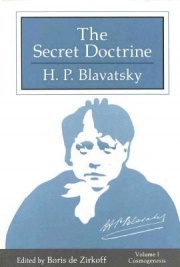
Theosophical Publishing House
- First edition of Volume 3, 1897.
- Three-volume edition, 1911. Reprinted in 1913, 1918, 1921, and 1928.
- Fourth (Adyar) edition, 6 vol., 1938. Volume five of this edition contains the text of the 1897 Volume 3, and volume six is an Index. Many of the footnotes introduced into the text in 1893 were restored as footnotes, and the few left in the text were enclosed in square brackets. This edition was reprinted in London in 1950.
- Fifth (Wheaton) edition, 6 vol., 1946. (By the Theosophical Press in Wheaton, Ill.)
- Sixth (Wheaton) edition, 6 vol., 1952. (By the Theosophical Press in Wheaton, Ill.)
- Fifth (Adyar) edition, 6 vol., 1962.
- Sixth (Adyar) edition, 6 vol., 1971. Published by Theosophical Publishing House (Adyar) and Theosophical Publishing House (Wheaton) with orange & white book jackets.
- Centenary Edition, 1988. Edited by Boris de Zirkoff in two volumes and Index, it follows the text and pagination of the original edition. Reprinted in 1993.
Theosophical University Press
In 1909 a new edition of Volumes I and II of The Secret Doctrine was produced by the Aryan Theosophical Press, Point Loma, California (since then moved to Covina, California, and known as the Theosophical University Press) under the direction of Katherine Tingley. This is virtually a reprint of the original 1888 edition with a scholarly transliteration of Sanskrit words according to an accepted standard, some corrections of faulty Greek and Latin and of obvious typographical errors, and the occasional substitution of square brackets in place of parentheses for clearness. No changes were made in H. P. Blavatsky's language and no passages were eliminated. This is the standard edition still being published by the Theosophical University Press, Covina.[27]
The 1909 edition was reprinted in 1917 as Second Point Loma edition, bound in four volumes, and a Third Point Loma edition took place in 1925 (bound in two and four volumes), all published by the Aryan Theosophical Press.
The Fourth edition was published by the Theosophical University Press, Covina, California, in 1947, as a reprint of the 1925 edition. The edition of 1952 is verbatim with the original 1888 edition. This was reprinted in The Netherlands in 1963 and 1970, and in the United States in 1974.
The Theosophy Company
The Theosophy Company of Los Angeles published in 1925 a photographic facsimile of the two volumes of The Secret Doctrine, bound in one volume. This edition provides the opportunity to study the work in exactly the way the author wrote it, although this edition perpetuates many typographical errors.[28] Several printings of it were issued in subsequent years.
Other digital sources
Teopedia offers many editions and also the SD Commentaries.
Translations
The Secret Doctrine has been translated into numerous languages, including the following editions:
- Croatian
- Danish
- Den hemmelige lære: en syntese af videnskab, religion og filosofi was published in 1975 by Strube.
- Dutch
- A. Terwiel translated De geheime leer: de samenvatting van wetenschap, godsdienst en wijsbegeerte, which was published in Amsterdam by Theosofische Uitgeversmaatschappij, 1907-1911 and 1923.
- French
- La doctrine secrète: synthèse de la science, de la religion & de la philosophie was published in several editions by La Famille Théosophique in Paris.
- German
- The Franz Hartmann translation, Grundriß der Geheimlehre, was published by Theosophisches Verlagshaus, Leipzig, in 1919.
- Robert Froebe's translation,Die Geheimlehre : die Vereinigung von Wissenschaft, Religion und Philosophie', was published in Leipzig by Friedrich in 1900 and reissued in 1919 by Theosophisches Verlagshaus.
- Japanese
- Shikuretto dokutorin uchu hasseiron was translated by Emiko Tanka and Jeff Clark and published by Shinchigaku Kyokai Nippon Rojji of Tokyo in 1989. It is available at Hathitrust.
- Shikuretto dokutorin o yomu was translated by Masato Tojo and published in Tokyo by Shuppanshinsha in 2001.
- Portuguese
- A doutrina secreta: síntese de ciência, filosofia e religião' was published in São Paulo, Brasil by Pensamento in 1995.
- Russian
- Translation by Russian Theosophical Society, 1910-15.
- H. I. Roeriсh, or Helena Ivanovna Roerich, wife of painter Nicholas Roerich, translated Tainaia doktrina: sintez nauki, religii i filosofii in the early 1930s and published in Riga in 1937. She was able to complete the translation in less than two years due to her great proficiency with languages. It is the most well-known and widespread edition nowadays, which is under constant reprinting since 1991 (see full list in Russian). This translation made from third edition.
- Third volume Ezotericheskoe uchenie : Tainaia doktrina, t. III : kliuch k tainam drevnei i sovremennoi nauki i teologii was translated by A.P. Heidok and published in 1993 in Moscow by Rossiiskoe teosofskoe obshchestvo (Russian Theosophical Society).
- Translation by V. V. Baziukin made from first edition. First volume published in 2012 online and in 2017 in hard copy in Delphis Publishing House; second volume published in 2020 in Delphis.
- Würzburg manuscript was translated by O. A. Fyodorova, 2020.
- See Teopedia for more information and links on different Russian editions.
- Spanish
- Don José Xifré of Spain, a personal pupil of Helena Petrovna Blavatsky, published a Spanish translation in 1895-98, but almost every copy was destroyed by the Roman Catholic Church, according to Boris de Zirkoff.[29]
Writings and teachings on The Secret Doctrine
Theosophists worldwide have written and lectured about The Secret Doctrine. Over 1800 articles are listed in the Union Index of Theosophical Periodicals giving reviews, excerpts, quotations, and analyses of the books' contents. That count is based only on the term "Secret Doctrine," and searching on additional terms reveals a vast periodical literature dealing with Blavatsky's masterwork.
Abridgements
Several authors have attempted to make The Secret Doctrine more accessible by creating abridgements and commentaries.
- Gomes, Michael, Ed. The Secret Doctrine: The Classic Work by H. P. Blavatsky, abridged and annotated. New York: Jeremy P. Tarcher/Penguin, 2009.
- "This single-volume edition, abridged and annotated by historian and Theosophical scholar Michael Gomes, places the ideas of The Secret Doctrine within reach of all who are curious. In particular, Gomes provides a critical sounding of the book's famous stanzas on the genesis of life and the cosmos - mysterious passages that Blavatsky said originated from a primeval source and which form the heart of The Secret Doctrine. Gomes scrupulously scales down the book's key writings on symbolism to their essentials, and offers notes and a glossary to illuminate arcane references. His historical and literary introduction casts new light on some of the book's sources and on the career of its brilliant and elusive author, one of the most intriguing personages of recent history. At once compact and representative of the work as a whole, this new edition of The Secret Doctrine brings unprecedented accessibility to the key esoteric classic of the modern era." [30]
- Preston, Elizabeth, and Humphreys, Christmas. An Abridgement of The Secret Doctrine. London: Theosophical Publishing House, 1966.
- "This book is the product of a team of scholars from many parts of the theosophical world. It can be regarded as an introduction to the complete work, but it is not a substitute for it. The Abridgement contains the basic principles in the actual words of Mme. Blavatsky from the 1888 edition ot THE SECRET DOCTRINE; matters that the compilers consider to be in these days of secondary importance have been left out." [31] This abridgement was translated into German in 1984.
- Hillard, Katharine. An Abridgment of the Secret Doctrine. New York: Qauterly Book Department, 1907.
- This abridgement seeks to offer a somewhat simplified version of the book. All Sanskrit terms are translated into English and some paragraphs rearranged to facilitate easier reading. Also, the sevenfold division of man is simplified into the triune constitution of body, soul, and spirit.
References within The Secret Doctrine
The Theosophical University Press Online offers a highly useful series of references to sources related to SD quotations.
- Secret Doctrine References — An Introduction by Ina Belderis.
- References — SD Volume 1.
- References — SD Volume 2.
- Bibliography to References.
Richard I. Robb, through his Wizards Bookshelf publishing house, offered a Secret Doctrine Reference Series of rare titles referenced in the SD. See his essay "Access to Great Ideas". Examples of books published in this outstanding series are:
- The Anugita, translated by K. T. Telang.
- Iamblichus: On the Mysteries, translated by Thomas Taylor.
- Sacred Mysteries among the Mayas and Quiches, by Augustus Le Plongeon.
- The Book of Enoch the Prophet, translated by Richard Laurence.
Commentaries
- Ashish, Madhava. Man, Son of Man: In the Stanzas of Dzyan. 1970. 352 pages.
- A continuation of Man, The Measure of All Things by Sri Krishna Prem, this book is a commentary to the stanzas of the second volume of The Secret Doctrine outlining the process of human evolution culminating in man as he is today.
- Barborka, Geoffrey A. The Divine Plan – Written in the Form of a Commentary on H. P. Blavatsky's Secret Doctrine – Expressly for the Purpose of Those Who Wish to Read and Gain a Deeper Understanding of “The Secret Doctrine” – Presenting an Exposition of the Doctrines of the Esoteric Philosophy Analysing and Explaining All the Terms Used. Adyar: The Theosophical Publishing House. 1961.
- Barborka presents an exposition of the esoteric doctrines of Cosmogenesis from Volume I of The Secret Doctrine, analyzing and explaining all the terms used. The Divine Plan is a particularly useful commentary, and stands as a classic of Theosophical literature in its own right.
- Barborka. Geoffrey A. The Peopling of the Earth: A Commentary on Archaic Records in the Secret Doctrine. 1975. 233 pages.
- Barborka recounts the story of how the first humans came to the Earth, as it is presented in the first three stanzas of the second volume of The Secret Doctrine. The book offers the student a synthesis of the teachings and assistance in understanding the symbols and cryptic expressions used by Mme. Blavatsky. This book is continued by The Story of Human Evolution.
- Barborka, Geoffrey A. The Story of Human Evolution. 1980. 147 pages.
- Based on Stanzas III to XII of the second volume of The Secret Doctrine, the author presents the evolutionary stages which have been accomplished by human beings since coming to the Earth. This book is a continuation of The Peopling of the Earth.
- Chodkiewicz, Kazimierz. Occult Cosmogony: A Modern Commentary to the Stanzas of Dzyan. 1957-1961. 5 vol.
- A commentary to the first volume of The Secret Doctrine comparing its teachings with the scientific knowledge of the time.
- Gomes, Michael, Ed. The Secret Doctrine Commentaries: The Unpublished 1889 Instructions. The Hague: I.S.I.S. Foundation, 2010.
- "Immediately after The Secret Doctrine was published, Blavatsky assembled a small group of students, at the Blavatsky Lodge in London, for more in depth inquiry and study of the ideas in the book. The Secret Doctrine Commentaries contains the never before published transcription of the shorthand notes of these Blavatsky Lodge meetings. Here is Blavatsky in dialogue with her students: Provocative, insightful, spontaneous, and inspiring of the deeper meaning. It offers a unique opportunity to read Blavatsky’s direct, prescient answers to questions on Cosmogenesis, Fohat, the infinitude of the Atom, the nature of Consciousness etc., giving the reader the impression of participating in these Blavatsky Lodge meetings themselves." [32]
- Prem, Sri Krishna. Man, the Measure of All Things: In the Stanzas of Dzyan. 1969. 360 pages.
- Based on the Stanzas found in the first volume of The Secret Doctrine, the author traces the story of the emergence of human consciousness from its divine source. It is a symbolic account of the evolution of the concrete universe.
- Preston, Elizabeth. The Story of Creation: According to The Secret Doctrine. 1968. 109 pages.
- The main teachings given in the Stanzas of Dzyan in the first volume of The Secret Doctrine are presented here in a simplified manner. Another essay by the same author, The Story of Man, deals with the teachings found in the second volume of HPB’s book.
- Tordoff, Harvey. O Lanoo!: The Secret Doctrine Unveiled. 1999. 126 pages.
- A poetical re-writing of the Stanzas of Dzyan which forms the basis to The Secret Doctrine, using HPB’s explanations it conveys the main concepts in simple, poetic, language.
Studies and courses
- Algeo, John. Getting Acquainted with The Secret Doctrine: A Study Course. 2007. 60 pages.
- A course based on the notes taken by Robert Bowen, a personal student of Mme. Blavatsky, which purportedly record her own advice as to how to approach the study of The Secret Doctrine.
- Argus, A Voyage of Discovery in The Secret Doctrine: A Centennial Homage, 1988. 134 pages.
- A collection of essays on fundamental teachings found in The Secret Doctrine, often containing comparisons with Western philosophies and modern scientific theories.
- Belderis, Jim. "The Eyes to See With: Working on The Secret Doctrine Index". 1998. Reprinted from Sunrise magazine, February/March 1998. This offers insights gained while working on an index to The Secret Doctrine.
- Benjamin, Elsie. Man at Home in the Universe: A Study of the Great Evolutionary Cycle. 1981. 35 pages.
- A general study of the cyclic evolution of humanity through the different "Globes", "Rounds", "Root-Races", and "Sub-Races" as depicted in The Secret Doctrine.
- Besant, Annie. The Pedigree of Man. 1943. 211 pages.
- A study of man’s three-fold origins based on the second volume of The Secret Doctrine, where Dr. Besant supplies information that further facilitates the study of HPB’s great work.
- Blavatsky, H. P. Evolution and Intelligent Design in The Secret Doctrine: The Synthesis of Science, Religion, and Philosophy. c2006. 241 pages.
- A selection of passages from The Secret Doctrine dealing with this subject, offering a middle ground for a perspective that is both religious and rational.
- Cooper-Oakley, Isabel. Studies in The Secret Doctrine. 1895., 30 pages.
- Two studies, one on the Monad and the other on the Tetraktys and Tetragrammaton, based on the teachings given in The Secret Doctrine.
- Gardner, Edward. The Fourth Creative Hierarchy. 1913. 32 pages.
- A study about the information given in The Secret Doctrine concerning the origin and evolution of the Monads now incarnated in the human kingdom.
- Hanson, Virginia. H. P. Blavatsky and The Secret Doctrine. 1988. 240 pages.
- Appearing first as a companion volume to An Abridgement of The Secret Doctrine, edited by E. Preston and C. Humphreys, this book offers a collection of articles by many well-known Theosophists that explore some of the contributions of HPB’s great opus to world thought.
- Judge, W. Q. Hidden Hints in The Secret Doctrine. 1892. 23 pages.
- Comments on selected passages from The Secret Doctrine by one of the founders of the Theosophical Society.
- Lancri, Salomon. Selected Studies in The Secret Doctrine. c1977. 86 pages.
- An outline of the main tenets in HPB’s work, supplying a useful guide for the student of The Secret Doctrine.
- Mills, Joy. An Approach to the Study of The Secret Doctrine., [195-?]. 12 pages.
- An exploration into how to study The Secret Doctrine, rather than what to study in it, based upon HPB’s own words and the advice of various renowned students.
- Mills, Joy. Living in Wisdom: Lectures on The Secret Doctrine. 1994. 57 pages.
- A collection of lectures by the very well-known Theosophist and student of The Secret Doctrine, in which she elaborates on the mythological nature of the contents of HPB’s book, particularly in reference to the origins and development of man.
- Noia, Beverley B. An Intuitive Approach to the Seven Stanzas of Dzyan. 1986. 29 pages.
- This program offers a series of exercises aimed at stimulating an intuitive understanding of the Stanzas of Dzyan which form the basis of The Secret Doctrine.
- Ohlendorf, W. C.. An Outline of The Secret Doctrine. c1941. 75 pages.
- A brief outline of the origin of the universe and man on Earth, based on the explanations given in The Secret Doctrine.
- Preston, Elizabeth. The Earth and its Cycles. 1954. 160 pages.
- A comparison between results of geological and archaeological research and the statements of The Secret Doctrine regarding the history of Earth and the development of human beings.
- Ransom, Josephine. Studies in The Secret Doctrine. 1934. 172 pages.
- A series of studies by a very well-known student of The Secret Doctrine exploring the hierarchy of spiritual beings and their role in the evolution of human beings.
- Robertson, John K. The Astrological Key to The Secret Doctrine. 1977. 18 pages.
- An astrological interpretation of world mythologies helps the reader to understand the system underlying the Stanzas of The Secret Doctrine.
- Sender, Pablo. Approaching the Secret Doctrine. Fohat Productions, 2023.
- In an approach turning study of the SD into a form of yoga, Dr. Sender presents Cosmogenesis in clear language with diagrams, followed by a series of meditations and exercises.
- Taylor, A. E. The Secret Doctrine: Commentaries and Analogies 1970-1971. 2 vol.
- By relating the esoteric principles expounded upon in the teachings of The Secret Doctrine to different aspects of human life, the author clarifies complex ideas for the reader.
- Theosophical Society (Great Britain). Centenary of "The Secret Doctrine". 1888-1988. 24 pages.
- A series of articles about The Secret Doctrine to commemorate the centenary of the book’s publication.
- Theosophical Society (Pasadena, Calif.). Report of Proceedings: Secret Doctrine Centenary. 1989. 121 pages.
- The report of the proceedings of the Secret Doctrine Centenary, held at Pasadena, California, on October 29-30, 1988, including lectures, panels and discussions among several well-known students of The Secret Doctrine.
- Trew, Corona. Studies in The Secret Doctrine. 1969. 40 pages.
- A study course on the Stanzas of Dzyan, the basis of the first volume of The Secret Doctrine that clarifies the fundamental principles of the building and origin of the cosmos.
- Trew, Corona. This Dynamic Universe. c1983. 167 pages.
- Three essays by the Science Group of the English Theosophical Research Center about universal energy or Fohat, universal law, and the purpose of the universe, based upon teachings given in The Secret Doctrine.
- Two students. Theosophical Gleanings. 1978. 76 pages.
- A collection of articles originally published in 1890 in a theosophical journal, where two students of The Secret Doctrine offer a survey of the fundamental principles of cosmic evolution depicted in Mme. Blavatsky’s book.
- Van Pelt, Gertrude W.. Archaic History of the Human Race. c1979. 52 pages.
- Using numerous quotes from The Secret Doctrine, the author offers a survey of the evolution of humankind, arranging the information in a systematic and chronological order.
- Wadia, B. P.. Studies in The Secret Doctrine. 1961-1963. 2 vol.
- A collection of articles written in two theosophical journals during the years 1922-25 (vol. 1) and 1934-36 (vol. 2), approaching different aspects of The Secret Doctrine.
- Warcup, Adam. Cyclic Evolution: A Theosophical View. 1986. 144 pages.
- An account of the process of evolution of life, from the spiritual realms to the physical plane, according to Mme. Blavatsky and her teachers.
- Wizards Bookshelf. Symposium on H. P. Blavatsky's Secret Doctrine. 1984. 110 pages.
- Seventeen papers by authors from four countries, presented in a symposium held at San Diego, California, July 21-22, 1984.
- Wood, Ernest. A "Secret Doctrine" Digest. 1956. 480 pages.
- The author offers a presentation of the laws and facts of nature and life as taught by H. P. Blavatsky, trying to explain the teachings without introducing anything of his own.
See also
- Book of Dzyan
- Stanzas of Dzyan
- Three Fundamental Propositions
- Recapitulation
- Robert Bowen Notes
- Concepts in The Secret Doctrine
Online resources
Articles and pamphlets
- The Secret Doctrine as a Contribution to World Thought by Sri Madhava Ashish
- Second book Review of The Secret Doctrine by Annie Besant
- Mistaken Notions on the Secret Doctrine by H. P. Blavatsky
- The Myth of the "Missing" Third Volume of The Secret Doctrine by Daniel H. Caldwell
- Authorship of Secret Doctrine by William Q. Judge
- Hidden Hints in the Secret Doctrine by William Q. Judge
- The Secret Doctrine in the Light of 20th-Century Thought by Jerry Hejka-Ekins
- The Secret Doctrine by Alvin Boyd Kuhn
- The Book of Dzyan Research Reports by David Reigle
- Seven articles on The Secret Doctrine by Pablo Sender
- The Writing of The Secret Doctrine by Kirby Van Mater
- Book of Dzyan Studies by various contributors on Theosophy.net
- The Secret Doctrine and its Study at Theosophical Society in America website
- A Beginner’s Guide To Studying The Secret Doctrine at Blavatsky Theosophy Group UK website
- Twenty-four articles compiled for The Secret Doctrine Symposium - Part 1 and Part 2 by David Bruce
- Compilation of articles related to the First Fundamental Proposition, Second Fundamental Proposition, and Third Fundamental Proposition at Philaletheians.co.uk
Books
- Transactions of the Blavatsky Lodge (HTML) at Universal Theosophy and ULT Phoenix's websites
- The Secret Doctrine Dialogues (HTML) at Universal Theosophy and ULT Phoenix's websites
- The Secret Doctrine Commentaries (PDF) at Point Loma Blavatsky House Website
- The Writing of The Secret Doctrine. A Chronology by Daniel Caldwell
- The Pedigree of Man by Annie Besant
- Theosophical Gleanings by Two Students (Annie Besant & Isabel Cooper-Oakley)
- An Intuitive Approach to the Seven Stanzas of Dzyan by Beverley Noia
- Archaic History of the Human Race by Gertrude W. van Pelt
- Reminiscences of H.P. Blavatsky and The Secret Doctrine by Countess Constance Wachtmeister
- Studies in The Secret Doctine by B. P. Wadia
Audio
- Introduction to the Study of The Secret Doctrine - Part 1, Part 2, Part 3, Part 4, Part 5, Part 6 by Ed Abdill
- Cosmogenesis - Part 1, Part 2, Part 3, Part 4, Part 5, Part 6, Part 7 by Geoffrey Hodson
- Secrets of The Secret Doctrine W. Doss McDavid
- Interpretation of The Secret Doctrine from 1888 to 1988 by Joy Mills
- Important Principles in The Secret Doctrine - Part 1, Part 2, Part 3, Part 4, Part 5 by Joy Mills
- Studies in The Secret Doctrine (Series #7) - Part 1, Part 2, Part 3, Part 4, Part 5, Part 6, Part 7, Part 8, Part 9, Part 10 by Joy Mills
- Studies in The Secret Doctrine (Series #11) - Part 1, Part 2, Part 3, Part 4, Part 5, Part 6 by Joy Mills
- Secret Doctrine Talks in Naarden by Joy Mills
- The Secret Doctrine: Cosmogenesis (Series #3) - Part 1, Part 2, Part 3, Part 4, Part 5, Part 6, by Pablo Sender
- The Secret Doctrine and America by Mitch Horowtiz
Video
- Foundations of the Ageless Wisdom (5 Parts) by Ed Abdill
- Introduction to the Study of The Secret Doctrine (5 Parts) by Ed Abdill
- The Secret Doctrine - A 100 Years Later (9 parts) by Joy Mills
- The Cosmogonic Processes (13 Parts) by Joy Mills
- Fundamental Teachings in The Secret Doctrine (5 Parts) Pablo Sender & Michele Sender
- Three Fundamental Propositions - Theory and Practice (8 Parts) by Pablo Sender
- Cosmogenesis 1st Series (6 Parts) by Pablo Sender
- Cosmogenesis 2nd Series (6 Parts) by Pablo Sender
- Cosmogenesis 3rd Series (6 Parts) by Pablo Sender
Bibliographies
Websites
- The Secret Doctrine Theosophical University Press online edition.
- The Secret Doctrine Universal Theosophy searchable online edition of the two volumes, with corrected spelling of foreign terms.
- Index to The Secret Doctrine Theosophical University Press online edition prepared by John P. Van Mater.
- About The Secret Doctrine Compilation of material at Blavatsky Net.
- An Invitation to The Secret Doctrine Includes The Secret Doctrine and Its Study by Robert Bowen, The Writing of The Secret Doctrine by Kirby Van Mater, and a Glossary of Terms by the Theosophical University Press.
- Studies in The Secret Doctrine WisdomWorld.org.
Notes
- ↑ Gomes, Michael, Ed., The Secret Doctrine: The Classic Work by H. P. Blavatsky, abridged and annotated, (New York: Jeremy P. Tarcher/Penguin, 2009), ix.
- ↑ Charles Johnston letter to J. D. Buck. November 17, 1891. Cincinnati Lodge Records. Theosophical Society in America Archives.
- ↑ Published by Theosophical Publishing House, Adyar, 1977, 2015.
- ↑ Published by the Blavatsky Study Center in Tucson, Arizona, 2015.
- ↑ Eleanor Broenniman, "A Plea for Justice" The Theosophical Messenger 19.4 (April, 1931), 371.
- ↑ Some Notes on The Secret Doctrine by Charles J. Ryan
- ↑ A. Trevor Barker, The Letters of H. P. Blavatsky to A. P. Sinnett Letter No. CXVI, (Pasadena, CA: Theosophical University Press, 1973), 79.
- ↑ Constance Wachtmeister, Reminiscences of H.P. Blavatsky and The Secret Doctrine (London: Theosophical Publishing Society, 1893), 33.
- ↑ James Morgan Pryse, "An Important Statement by Mr. J. M. Pryse" The Messenger 14.6 (November, 1926), 125.
- ↑ Posting by David and Nancy Reigle to Theos-Talk discussion group. May 5, 2014.
- ↑ Nicholas Weeks email to Janet Kerschner. May 24, 2019. Theosophical Society in America Archives digital files.
- ↑ Annie Besant, An Autobiography (Adyar, Madras: Theosophical Publishing House, 1984), 310.
- ↑ [The Blavatsky Archives Online].
- ↑ M. A. (Oxon.) [William Stainton Moses], "Notes by the Way," Light No. 435 Vol XI (May 4, 1889). Quoting the Pall Mall Observer's review of The Secret Doctrine.
- ↑ M. A. (Oxon.) [William Stainton Moses], "Notes by the Way," Light No. 435 Vol XI (May 4, 1889).
- ↑ Boris de Zirkoff, “What is The Secret Doctrine”, Theosophia XXV:1
- ↑ Charles Johnston letter to J. D. Buck. November 17, 1891. Letter number 16. Cincinnati Theosophical Society Records. Records Series 20.02.01. Theosophical Society in America Archives.
- ↑ Johnston’s Outline was published as "An Outline of the 'Secret Doctrine'" in Lucifer, from October, 1891 to May, 1892. See: Hidden Wisdom: Collected Writings of Charles Johnson, 2014, Vol. 3, p. 241.
- ↑ Robert Bowen, notes on "The Secret Doctrine and Its Study", April 19, 1891. Notes recorded less than three weeks before the death of Madame Blavatsky.
- ↑ Helena Petrovna Blavatsky, Collected Writings vol. X (Wheaton, IL: Theosophical Publishing House, 1988), 157-158.
- ↑ Helena Petrovna Blavatsky, The Se:cret Doctrine vol. I, (Wheaton, IL: Theosophical Publishing House, 1993), [59].
- ↑ See Facts about The Secret Doctrine by G.R.S. Mead
- ↑ Helena Petrovna Blavatsky, The Secret Doctrine Index, (Wheaton, IL: Theosophical Publishing House, 1993), 476-477.
- ↑ James Morgan Pryse, "An Important Statement by Mr. J. M. Pryse" The Messenger 14.6 (November, 1926), 125.
- ↑ C. Jinarajadasa, "The Writing of the Secret Doctrine" The Messenger 11.3 (Aug 1923), 43.
- ↑ Some Notes on The Secret Doctrine by Charles J. Ryan
- ↑ Some Notes on The Secret Doctrine by Charles J. Ryan
- ↑ Some Notes on The Secret Doctrine by Charles J. Ryan
- ↑ Boris de Zirkoff letter to Willamay Pym. January 1, 1979. Boris de Zirkoff Papers. Records Series 22. Theosophical Society in America Archives.
- ↑ Gomes, Michael, Ed., The Secret Doctrine: The Classic Work by H. P. Blavatsky, abridged and annotated, (New York: Jeremy P. Tarcher/Penguin, 2009), from the book jacket.
- ↑ Advertisement in supplement to The Theosophical Journal, Jan-Feb 1966.
- ↑ Gomes, Michael, Ed., The Secret Doctrine Commentaries: The Unpublished 1889 Instructions, (The Hague: I.S.I.S. Foundation, 2010), from the book jacket.
